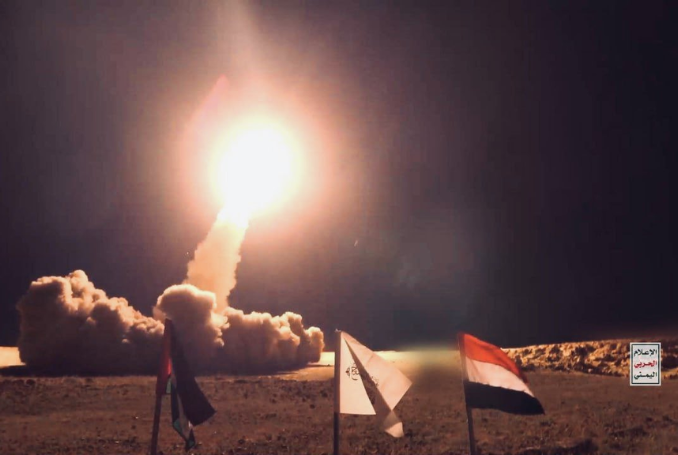
“Because it’s so cheap for them to try to get a drone or a missile every few days or weeks into Israel, they can win this.”
An Israeli official has described the Ansarallah movement, affiliated with the Yemeni Armed Forces, as “more technologically advanced than perceived by many” and should not be “underrated,” the Washington Post reported.
The remarks by the official who spoke on condition of anonymity come as Israel prepares “to fight along a new front” in Yemen, the report said, adding that the group “was once considered by Israel’s security establishment to be a more manageable threat than Hamas in Gaza or Hezbollah in Lebanon.”
This morning Houthi military spokesman Yahya Saree announced that Yemeni Armed Forces had conducted several military operations against Israeli targets within Israel and in the Arabian Sea.
With the elimination of Hezbollah from the war against Israel, only Hamas and the Houthis… pic.twitter.com/LiRzlL8O76
— 5Pillars (@5Pillarsuk) December 27, 2024
The report cites experts as saying that Ansarallah’s drones, missiles and projectiles have managed to overcome Israel’s once-celebrated air defense systems, and has raised a dilemma for the Israeli army, that of “how to defeat an enemy with a relatively cheaper and comparatively ample stockpile of weapons.”
It quotes a former official on Israel’s National Security Council, Yoel Guzansky, as saying “The Houthis (Ansrallah – PC) want a war of attrition on Israel, to continue firing so that they can say, ‘We are the real resistance.’”
Cost of War
The cost of such a war is a factor for Israel, though, the report noted, as the Yemeni group’s drones and missiles cost around “several thousand dollars each.” However, it costs Israel “tens of thousands of dollars, at least” to intercept those weapons.
Guzansky explained, “Because it’s so cheap for them to try to get a drone or a missile every few days or weeks into Israel, they can win this.”
“The question is now, how does Israel avoid falling into their trap?” he asked.
Israel is preparing for a new front against the Houthis in Yemen, another chapter in a war that continues to expand beyond Israel’s physical borders, with Israeli Prime Minister Benjamin Netanyahu saying Thursday that the fight “is only getting started.” https://t.co/RYtteXL5By
— The Washington Post (@washingtonpost) December 27, 2024
The escalation arises as the Yemeni group continues to express solidarity with Gaza amidst the ongoing Israeli genocidal war on the Strip.
Ansarallah has launched missile and drone strikes on Israeli targets, including cargo ships in the Red Sea and Tel Aviv.
Escalating Attacks
On Friday, the group confirmed it had targeted the Ben Gurion Airport in the Israeli capital with a Palestine-2 hypersonic ballistic missile.
Spokesman Brigadier General Yahya Saree also said the armed forces targeted a vital Israeli site in Tel Aviv using a drone, in addition to targeting the ship, Santa Ursula, in the Arabian Sea east of Socotra Island “with a number of drones, and the hit was direct.”
Israel’s Biblical Wars of ‘Self Defense’: The Myth of the ‘Seven War Fronts’
The attacks follow Israel’s bombing of several targets in Yemen on Thursday night, including the Sanaa International Airport and the Ras Isra oil port in Al-Hudaydah. At least three people were killed in the attacks and several were injured.
‘Seven Fronts’
Danny Orbach, a military historian at the Hebrew University in Jerusalem, told the Washington Post that the Yemeni group’s advantage was its location.
They were firmly immersed in a mountainous country, “without places or assets that are so central to their operations that striking them would incapacitate them,” explained Orbach.
Israeli Prime Minister Benjamin Netanyahu has said that Israel was “defending itself on seven fronts.” This includes Gaza, the West Bank, Lebanon, Syria and Yemen.
Saree has said that the Yemeni movement’s operations “will not stop until the aggression on Gaza strops and the siege is lifted.”
Ongoing Genocide
The ongoing Israeli assault on the Gaza Strip, which began on October 7, 2023, has led to a humanitarian crisis of unprecedented scale. As the death toll among besieged and starved Palestinian civilians continues to rise daily, Israel is currently facing charges of genocide against Palestinians before the International Court of Justice (ICJ).
Dr. Mustafa Barghouti: The Israeli army invaded Kamal Edwan hospital in the North of Gaza burning it and arresting many of the patients and medical personnel after forcing them to be naked. pic.twitter.com/MlQXzRqN8S
— Mustafa Barghouti @Mustafa_Barghouti (@MustafaBarghou1) December 27, 2024
According to Gaza’s Ministry of Health, at least 45,436 Palestinians have been killed, and 108,038 wounded in Israel’s ongoing genocide in Gaza starting on October 7, 2023. The toll is expected to rise further, with at least 11,000 people still unaccounted for, presumed dead under the rubble of their homes across Gaza.
The war, which Palestinians call “Operation Al-Aqsa Flood,” began after a military operation carried out by Hamas on Israeli territory. Israel reports that 1,200 of its soldiers and civilians were killed during the initial attack on October 7. However, Israeli media have raised concerns that a significant number of Israeli casualties were caused by ‘friendly fire’ during the assault.
Humanitarian Disaster
Human rights organizations, both Palestinian and international, have reported that the overwhelming majority of the casualties in Gaza are women and children. The ongoing violence has also exacerbated an acute famine, with thousands of children among the dead, highlighting the severity of the humanitarian disaster.
A food crises monitoring organization withdrew a new report this week warning of imminent famine in northern Gaza after the United States government asked for its retraction, the Associated Press has reported, citing US officials.https://t.co/xfZZto0McN pic.twitter.com/VIWn1Il7cA
— The Palestine Chronicle (@PalestineChron) December 27, 2024
The war has displaced nearly two million people from their homes across Gaza, with the majority of the displaced forced into the already overcrowded southern region of the Strip. The population in Gaza remains trapped in the ongoing conflict, with little access to basic necessities such as food, water, and medical care.
(The Palestine Chronicle)
